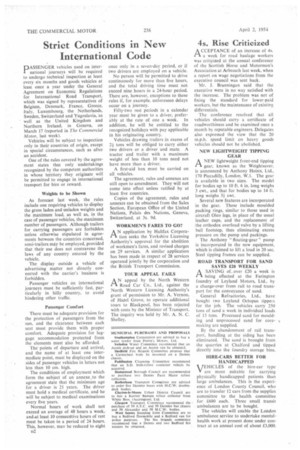Strict Conditions in New International Code
Page 42

If you've noticed an error in this article please click here to report it so we can fix it.
D ASSEN G ER vehicles used on inter'. national journeys will be required to undergo technical inspection at least every six months and goods vehicles at least once a year under the General Agreement on Economic Regulations for International Road Transport, which was signed by representatives of Belgium, Denmark, France, Greece, ttaly. Luxembourg, the Netherlands, Sweden, Switzerland and Yugoslavia, as well as the United Kingdom and Northern Ireland. in Geneva, on March 17 (reported in The Commercial Motor, last week).
Vehicles will be subject to inspection only in their countries of origin, except in special circumstances, such as after an accident.
One of the rules covered by the agreement states that only undertakings recognized by the competent authorities in whose territory they originate will be permitted to engage in international transport for hire or reward.
Weights to be Shown As forecast last week, the rules include one requiring vehicles to display the gross laden and unladen weights and the maximum load, as well as, in the case of passenger vehicles, the maximum number of passengers. Although trailers for carrying passengers are forbidden unless otherwise stipulated in agreements between the countries concerned, semi-trailers may be employed, provided that their use does not contravene the laws of any country entered by the vehicle.
The display outside a vehicle of advertising matter not directly connected with the carrier's business is forbidden.
Passenger vehicles on international journeys must be sufficiently fast, particularly in hilly country, to avoid hindering other traffic.
Passenger Comfort There must be adequate-provision for the protection of passengers from the sun, and the clearance between each seat must provide them with proper comfort. Adequate provision for luggage accommodation protected from the elements must also be afforded.
The points of departure and arrival, and the name of at least one intermediate point, must be displayed on the sides of passenger vehicles in letters not less than 10 cm. high.
The conditions of employment which form the subject of an annexe.to the agreement state that the minimum age for a driver is 21 years. The driver must hold a medical certificate, and he will be subject to medical examinations every five years.
Normal hours of work shall not exceed an average of 48 hours a week,.
and-at least 10 consectltive hours of rest must be taken in a period of 24 hours. This, however, may be reduced to eight D2 once only in a seven-day period, or if two drivers are employed on a vehicle.
No person will be permitted to drive continuously for more than five hours, and the total driving time must not exceed nine hours in a 24-hour period. There are, however, exceptions to these rules if, for example, unforeseen delays occur on a journey.
Fifty-two rest periods in a calendar year must be given to a driver, preferably at the rate of one a week. In addition, he will be entitled to the recognized holidays with pay applicable in his originating country.
Vehicles drawing trailers in excess of 2i tons will be obliged to carry either two drivers or a driver and mate. A tractor and trailer with a maximum weight of less than 10 tons need not have more than a driver.
A first-aid box must be carried on all vehicles.
The agreement, rules and annexes are still open to amendment. They will not come into effect unless ratified by at least five countries.
Copies of the agreement, rules and annexes can be obtained from the Sales Section, European Office of the United Nations, Palais des Nations, Geneva, Switzerland, at 3s. 9d.
WORKMEN'S FARES TO GO?
A N application by Halifax Corpora
tion seeks the Yorkshire Licensing Authority's approval for the abolition of workmen's fares, and revised charges on 29 services. A similar application has been made in respect of 28 services operated jointly by the corporation and the British Transport Commission.
TOUR APPEAL FAILS
ANappeal by the North Western Road Car Co., Ltd., against the North Western Licensing Authority's grant of permission to Mr. A. Vernon, of Hazel Grove, to operate additional tours to Blackpool. has been rejected with costs by the Minister of Transport. The inquiry was held by Mr. A. N. C. Shelley.








































































































